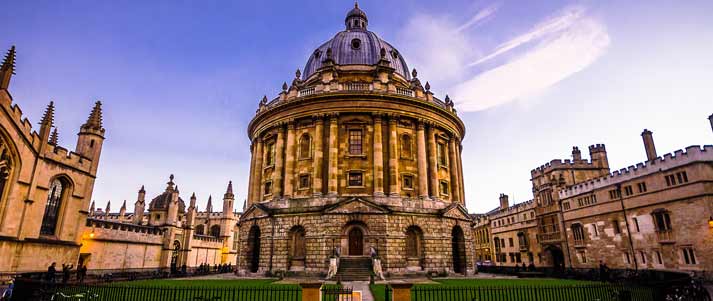Scholarships for international students in the UK
If you're an international student looking for funding to study in the UK then you've come to the right place – here we share everything you need to know.

Credit: Rawpixel - Shutterstock
With some of the best universities in the world and strong employment prospects, the UK is a popular destination for students across the globe.
But studying at university as an international student can be seriously costly. Since fees often top £20,000 a year before living expenses, the majority of students will need financial help from somewhere to make it work.
So, where can you get this financial support? Can international students get a Student Loan? Where can you find scholarships and how do you apply to them?
To help you out, we've put together this complete guide to funding and scholarships for international students in the UK.
What's in this guide?
- How much are tuition fees for international students in the UK?
- Where can you get financial support to study in the UK?
- How to get a scholarship to study in the UK
- Where to search for international scholarships
- Global scholarships for international students
- International scholarships by country
- University-specific international scholarships
- Can international students work in the UK?
How much are tuition fees for international students in the UK?
As an international student studying in the UK, you'll be paying tuition fees substantially higher than home students.
Although they're capped at £9,250 for domestic students, there's no cap for international students. From the 2021/22 academic year onwards, this includes new EU students too.
Fees are determined by the individual university and the course you're studying. For example, courses that involve expensive equipment and resources will generally cost more.
Humanities and social science degrees tend to cost the least, with degrees involving laboratory or clinical work costing the most.
- Undergraduate degrees – These start at around £9,250 a year for lecture-based courses but at some unis were almost £40,000.
- Postgraduate degrees – Classroom-based degrees cost anywhere between £9,000 and £30,000 a year. However, MBAs and medical degrees typically cost a lot more – around £67,000 in some cases.
If you want more information on fees, take a look at our guide to tuition fees for international students which goes into much more depth on this.
Don't forget that, in order to obtain the student visa necessary to study in the UK, you'll also need to prove you have enough money in your international student bank account.
If your course lasts less than nine months, you'll need to have £1,023 per month (£1,334 if you're studying in London) for each month of your course (up to nine months).
In a nutshell, studying in the UK as an international student costs a lot of money. But financial aid is out there if you know where to look.
EU students pre-2021
Things have changed for EU students. If you started university before or during the 2020/21 academic year, your tuition fees will be the same as home students (capped at £9,250 a year), if you are:
- From an EU country
- A foreign worker from the European Economic Area (EEA) based in the UK
- The child of a Turkish worker living in the UK.
* Note that these are just some of the eligibility criteria for qualifying as an EU student. Our guide to UK tuition fees for EU students covers things in more detail.
Plus, you'll be eligible for a government Student Loan covering the cost of your tuition fees. Although not all EU students are eligible for a Maintenance Loan, if you were already studying in the 2020/21 year and were eligible then, you will continue to be so for the remainder of your studies.
However, due to Brexit, since August 2021, new EU students no longer have access to Student Finance in the UK. This means they aren't able to take out Student Loans to cover tuition fees and living expenses the same way UK students can.
To clarify, this only applies to new EU students who were not already studying in the UK before August 2021. EU, EEA and Swiss nationals who started university in the 2020/2021 academic year or earlier are exempt from this, as are Irish nationals who started at any time. This means that they will continue to have the same access to Student Finance as they did pre-Brexit.
Where can you get financial support to study in the UK?

While there usually aren't any international student loans available, there are loads of options out there to get funding, so do plenty of research and explore every avenue.
Here's just a quick summary of some of the main routes you might want to take a look at:
Study abroad programmes
A more affordable way to study in the UK as an international student might be through an exchange or study abroad programme.
This would involve enrolling as a student at a university in your home country and studying in the UK for a semester or year.
Check individual universities to see whether they have any partnerships with universities in the UK before you apply.
International Student Loans
As an international student, you won't be eligible for a loan from the UK government like home or some EU students. However, there are other educational loans out there that you might want to look into.
For example, US students can apply for a Foreign Enrolled Loan if they're planning on studying abroad for a short period of time, such as for a semester or year. If you want to study at a university abroad full-time, you can apply for a Study Abroad Loan instead.
Individual countries will have different schemes in place for this, so make sure to research loans for students from your own country.
Banks
Check whether banks in your home country provide loans for students to help them cover the costs of study and living expenses.
Commercial banks providing loans aimed at students will generally charge a lower interest rate than they would for other types of customers and their terms may be more flexible, so this is also an option worth considering.
Private companies
Private companies sometimes offer financial support for you to study in the UK under the condition that you work for them for a certain amount of time after graduation.
If there are any large companies which are keen to employ graduates of your subject, this is worth looking into. This is especially true for those interested in pursuing a career in finance. Check out the different schemes banks and big financial services companies have to offer.
Family
You probably wouldn't be searching for scholarships if you had the money yourself, but many international students fund their degrees with the help of family members.
If you think there's a chance your parents or wider family might be able to give you some financial help, it may be worth discussing.
Scholarships
This is the big one. Scholarships for international students are one of the main funding sources for those looking to study abroad.
There's a huge amount out there, but with varying eligibility criteria, they can be tricky to navigate. Keep reading and we'll take you through it.
How to get a scholarship to study in the UK
There are loads of scholarships for international students in the UK up for grabs. This is great news, but it's important to exercise caution as they are seriously competitive and often have very stringent eligibility criteria.
Plus, the vast majority of them are for postgraduate rather than undergraduate degrees. Undergraduate scholarships, bursaries and fee waivers are available, but are less common – your best option is to scout out individual universities which provide these.
If you do your research thoroughly, meet the eligibility criteria and prepare a strong application, then, of course, you stand a good chance of securing a scholarship.
But there are no guarantees, so you should always think about what you'll do if you're unsuccessful.
Applications for scholarships vary. In most cases, they'll involve an application form, but some might also ask you to complete a written assignment or test and attend an interview.
Scholarships come in all shapes and sizes and from a surprising amount of sources. There are three main types you will want to investigate:
- Global scholarships – These are broader scholarships not tied to a specific country or university. However, they're not open to everyone and still have strict eligibility criteria.
- Country-specific scholarships – These are scholarships for students from a specific country.
- University scholarships – A lot of UK universities will offer their own scholarships and financial support for international students coming to study at their institution.
We've included some examples of these different types of scholarships below.
Where to search for international scholarships
As we've said, there's a huge range of scholarships for international students in the UK and it would be impossible for us to cover them all here. Luckily there are some databases that compile lots of scholarships in one place.
Here are a few of the most reliable and comprehensive:
- International Scholarships
- International Education Financial Aid (IEFA)
- Scholarship Portal
- British Council Study UK (it's worth contacting your local British Council office to find out more about scholarships for students in your country).
Global scholarships for international students

These are scholarships that aren't restricted to students from a specific country. However, they're not for students from all countries, so make sure you read the small print, as well as the eligibility criteria we've summarised here.
Plus, there are loads more scholarships that we haven't listed. These are just some of the main ones and a good starting point for your research.
Chevening Scholarships
Level of study
Master's.
Eligible countries
Over 160 countries worldwide. The number of scholarships available varies from country to country but, in total, well over 1,000 are awarded each year.
Other eligibility criteria
Among the eligibility criteria for Chevening Scholarships are:
- You must return to your home country to work for at least two years after graduation
- You need the equivalent of a 2:1 honours degree
- You must have at least two years of work experience.
When do applications open?
Applications for Chevening Scholarships typically open in August or September of the year before you're due to start studying. The deadline usually falls in October or early November.
Chevening Scholarships information
Chevening Scholarships are funded by the Foreign, Commonwealth and Development Office. They're awarded to students with strong academic ability and clear leadership skills. The scholarships cover flights, accommodation and all fees related to your course.
They're looking for people who have the potential to become pioneers in their field and are committed to returning to their home country to contribute to its socio-economic development through their work.
You'll be expected to apply to three separate courses at UK universities, although you don't need to hold any offers before you can apply for the scholarship.
The scholarships are competitive and the application is rigorous – you'll need to fill in an application form, attend an interview and provide references.
Commonwealth Scholarships
Level of study
Master's and PhD.
Eligible countries
All Commonwealth countries.
Other eligibility criteria
Among the eligibility criteria for Commonwealth Scholarships are:
- You must be a Commonwealth citizen, refugee or British-protected person
- You'll typically also need a minimum 2:1 honours degree to study for a master's, or already have an appropriate master's if you'd like to study for a PhD.
When do applications open?
Applications are typically open between September and December prior to your proposed start date.
Commonwealth Scholarships information
There are different types of Commonwealth Scholarships, with different schemes for varying levels of study and country of origin (usually split based on countries' economic statuses).
One type of scholarship on offer is the Shared Scholarship – for these scholarships, you must apply through one of the participating UK universities. These are for candidates from least developed and lower-middle-income Commonwealth countries, for full-time master's study on selected courses, jointly supported by UK universities.
They also offer Split-Site Scholarships which enable you to spend up to a year studying at a UK university as part of your PhD, and Distance Learning Scholarships, which enable you to study for a master's while living in your home country.
A scholarship will typically cover your tuition fees, a monthly living allowance and travel to and from the UK.
Regardless of the scholarship you apply for, it should be offered under one of the following six themes:
- Science and technology for development
- Strengthening health systems and capacity
- Promoting global prosperity
- Strengthening global peace, security and governance
- Strengthening resilience and response to crises
- Access, inclusion and opportunity.
GREAT Scholarships
Level of study
Postgraduate.
Eligible countries
15 countries across the world, with the majority located in Asia.
Other eligibility criteria
Eligibility criteria will vary depending on your country of origin and the university you're applying to, but typically you'll need to be a passport holder of one of the eligible countries.
When do applications open?
Varies across UK institutions.
GREAT Scholarships information
GREAT Scholarships support students who want to carry out postgraduate study at universities in the UK. Scholarships are worth £10,000 each.
Dozens of UK universities are part of the programme, and each will vary slightly in terms of eligibility criteria, available courses and the number of scholarships being awarded – so it's worth checking out the information provided by your university of interest as well.
International scholarships by country

Pretty much every country will have its own scholarships for students wishing to study abroad. These come from a whole range of different sources, and in some cases have pretty niche eligibility criteria.
We've listed just a few below for some of the countries that international students in the UK often hail from, just to give you a taste of what's out there.
Canadian Centennial Scholarship Fund (Canada)
Level of study
Postgraduate.
Eligibility criteria
Applicants must be Canadian citizens with a valid Canadian passport. You must also be currently enrolled on a postgraduate programme at a UK institution, having completed at least one term, with at least one term remaining.
When do applications open?
Applications tend to open at the start of the year, closing around the beginning of March.
Canadian Centennial Scholarship Fund information
This particular fund is only open to students on a full-time, multi-year postgraduate programme.
Each individual award is worth up to £5,000. As part of the application process, you'll need to submit a personal statement. If shortlisted, you will then attend an interview to discuss your application with the committee.
Inlaks Shivdasani Scholarships (India)
Level of study
Postgraduate.
Eligibility criteria
Among the eligibility criteria for Inlaks Shivdasani Scholarships are:
- You must be an Indian citizen and be living in India at the time of your application
- You must hold a first-class undergraduate degree
- You must be aged 30 or under.
When do applications open?
Applications for this fund usually open in January or February, and close in March or April.
Inlaks Shivdasani Scholarships information
The Inlaks Scholarship provides up to US $100,000 (£78,511*) to cover tuition fees, living expenses, one-way travel and health insurance.
You need to be able to prove you're an academic and personal achiever, and that you've got the potential to really excel on your chosen course.
The Foundation also has joint scholarship schemes with Imperial College London, Royal College of Art (RCA) London, the University of Cambridge via the Cambridge Trust, Hertie School in Berlin and King's College London (for PhD students in the faculties of Social Science & Public Policy and Arts & Humanities).
* Currency conversions rounded to the nearest whole pound, correct at the time of writing.
The Oxford and Cambridge Society of India Scholarships (India)
Level of study
Undergraduate and postgraduate.
Eligibility criteria
Among the eligibility criteria for this scholarship are:
- You must be under 30 years of age on 1st September in the year of application
- You must ordinarily reside in India and be an Indian citizen
- You must have applied and secured admission to study a full-time course at either the University of Oxford or the University of Cambridge.
When do applications open?
The application process typically opens in late February or early March and closes in May.
The Oxford and Cambridge Society of India Scholarships information
The Oxford and Cambridge Society of India (OCSI) is a group of alumni who created a scholarship fund to help Indian students fund their degrees at the two institutions.
The scholarships are competitive and the total amount of funding is dependent on donors. They only cover part of the cost of a degree and range from 100,000 to 400,000 rupees (£941 – £3,764*).
They're also often tied to a specific college at one of the universities, and this depends on the donor. Other grants may also become available to applicants via the society depending on how much is donated per academic cycle.
* Currency conversions rounded to the nearest whole pound, correct at the time of writing.
Marshall Scholarships (USA)
Level of study
Postgraduate.
Eligibility criteria
Among the eligibility criteria for Marshall Scholarships are:
- You must be a US citizen
- By the time you take up your scholarship, you must hold an undergraduate degree with a minimum 3.7 grade point average, obtained from an accredited four-year college or university in the USA
- You cannot have previously studied (or be studying) at a British university, or hold a British degree or degree-equivalent qualification.
When do applications open?
Applications tend to open in the summer of the year before you're due to start studying.
Marshall Scholarships information
The Marshall Scholarship is designed to help intellectually talented young Americans with "leadership potential" study at university in the UK.
Selection criteria are divided equally between academic merit, leadership potential and ambassadorial potential – essentially how you could help strengthen relations between the UK and US.
You can apply for a one-year or two-year scholarship, and two-year scholarships have the potential to be extended to three years, although this is not guaranteed.
Awards vary in value according to the individual circumstances of each scholar but are worth on average around £38,000 a year. This is to cover living expenses, tuition fees and study materials, travel to and from the USA as well as daily travel in the place of study.
Fulbright Commission Scholarships (USA)
Level of study
Postgraduate.
Eligibility criteria
You must be a US citizen (or a dual US-UK citizen) with a bachelor's degree or equivalent and, crucially, not currently residing in the UK.
When do applications open?
The application process typically opens in April and closes in October, both in the year before you intend to start your studies.
Fulbright Commission Scholarships information
The Fulbright Commission offers awards to allow US students to complete postgraduate study in the UK.
There are dozens of different awards available, either at specific universities or as an 'All Disciplines Award' which can be used for any master's or doctoral degree at any university.
Eligibility criteria and courses vary across universities, but typically they'll want people with leadership potential and a desire to learn more about the UK while acting as an ambassador for the US.
Again, exactly what the scholarship entails varies across institutions, but you should expect it to cover tuition fees and living costs for at least one year.
University-specific international scholarships

Credit: David Iliff - Flickr
There's a huge range of scholarships and funding awards offered by universities across the UK – so many that we're not able to list them all here.
We've picked out some for three major universities below, but we would recommend checking with individual institutions yourself.
The information should be freely available on university websites, but if you're struggling to find it or have questions, drop them an email. Make sure you include the course you're looking to study and your nationality as these will likely affect your eligibility.
Cambridge Trust (University of Cambridge)
Level of study
Undergraduate and postgraduate.
Eligible countries
All.
Other eligibility criteria
You must be applying for funding towards a new course, not one you are already part-way through.
When do applications open?
No date is specified, but you'll be invited to apply for funding if and when you receive an offer of admission from a Cambridge college.
Cambridge Trust information
The Cambridge Trust offers scholarships to students at a variety of levels, although most scholarships are awarded to those wishing to pursue a postgraduate degree.
Scholarships range from awards funding part of your tuition fees to be able to attend the university to full funding plus a stipend for living expenses. Financial needs will be taken into consideration.
Gates Cambridge (University of Cambridge)
Level of study
Postgraduate.
Eligible countries
All.
Other eligibility criteria
You must be a citizen of a country outside the UK and be applying for a full-time postgraduate course. You can also apply for funding if you are doing a part-time doctoral degree.
When do applications open?
Applications open in September and usually close in December or January (depending on your course), but for US students the process typically closes in October.
Gates Cambridge information
The scholarship covers a maintenance allowance (£20,000), tuition fees, visa costs, the healthcare surcharge and some travel costs. The award is for up to four years for PhD students.
There is also funding available to attend conferences and courses, undertake fieldwork, cover maternity or paternity leave, financial hardship, and a family allowance. This is awarded on a discretionary basis.
Successful applicants need to show their academic excellence, great leadership potential and a commitment to improving the lives of others.
Rhodes Scholarship (University of Oxford)
Level of study
Postgraduate.
Eligible countries
Over 20 countries across the world.
Other eligibility criteria
The criteria will vary depending on the country you apply from, but generally, you must:
- Be aged between 19–23 when you apply
- Hold a bachelor's degree
- Meet the English language requirements of the programme.
When do applications open?
The application process usually opens in June and closes around September/October, both in the year before you intend to start studying.
Rhodes Scholarship information
One of the oldest and most prestigious international scholarship programmes in the world, the Rhodes Scholarship has rigorous selection criteria.
They're not only looking for students with academic excellence but also those who get involved in extracurricular activities such as sports, debate, music and theatre. But criteria vary from country to country, so make sure you double-check before applying.
Reach Oxford Scholarship (University of Oxford)
Level of study
Undergraduate.
Eligible countries
Dozens of low-income countries around the world.
Other eligibility criteria
Among the eligibility criteria for this scholarship are:
- You must be of the "highest academic ability"
- You should also be intending to return to your country of ordinary residence after your studies.
When do applications open?
The application process usually opens in January and closes in February.
Reach Oxford Scholarships information
Reach Oxford Scholarships (formerly known as the Oxford Student Scholarships) are offered to students from low-income countries who are unable to study for a degree in their home nation. This can be for political or financial reasons, or because the appropriate educational infrastructure isn't available.
Not all colleges are able to offer Reach Oxford Scholarships every year, so double-check that yours is. The scholarships cover course fees, a grant for living costs and one return airfare per year. The scholarship funds all courses except medical degrees.
Hornby Trust (University of Exeter)
Level of study
Master's (specifically in English Language Teaching).
Eligible countries
Dozens of low- and middle-income countries across the world.
Other eligibility criteria
Among the eligibility criteria for this scholarship are:
- You must have at least three years of full-time English language teaching experience
- You must hold a full undergraduate degree
- You must meet the English speaking proficiency requirements stipulated by the university.
When do applications open?
The application process usually opens in November and closes in April.
Hornby Trust information
The Hornby Trust Scholarship is for experienced English Language Teachers who have the potential to shape the future of the discipline.
The scholarship is for the one-year TESOL master's at the University of Exeter and covers tuition fees, a monthly stipend to meet accommodation and living costs and travel to Exeter.
Can international students work in the UK?
Your visa will specify whether you're allowed to work in the UK and for how many hours.
This will typically be 20 hours a week during term time for those studying at degree level, and you'll be allowed to work full-time during the holidays, as well as before and after term starts.
However, don't bank on being able to fund your living costs with a part-time job. It's unlikely you'll be able to earn enough to cover all your expenses, and you don't want your job to interfere with your studies.
Also, as an international student on a student visa, you can't:
- Take a gap year to work full-time while staying in the UK to study
- Claim welfare benefits or tax credits for extra financial support.
Now all that's left is to make the move. Good luck!
Make sure you have the right international bank account to stash those funds in once you hit UK shores!








